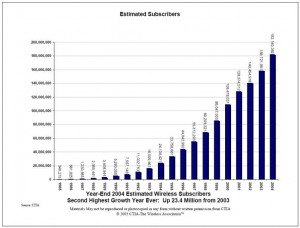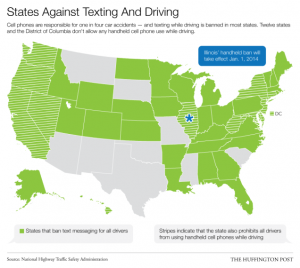The existence of wireless devices can be traced back to as early as 1908. Oakland Transcontinental Aerial Telephone and Power Company claimed to have developed wireless technology but never started production. Wireless networks as we know them today really started in the mid 1980’s. The proliferation of cell phone usage has expanded dramatically since the mid-1980’s. The graph below shows yearly, the explosion in cell phone subscribers.
As a result, governing bodies have been playing catch up to enact laws to keep pace with the expanding technology. Below is another graph, that details the states that have banned texting. Some states, such as New Jersey have banned texting and cell phone usage while operating a motor vehicle.
Why have states such as New Jersey banned texting and cell phone usage while operating a motor vehicle? It has been well known that distracted driving has caused motor vehicle accidents that have resulted in personal injuries and even deaths. The use of cell phones to make telephone calls and texting removes the drivers focus from operation a motor vehicle to using a cell phone. Driving is dangerous to begin with, but add driving with a cell phone, this only enhances the danger. New Jersey has recognized this and enacted one of the toughest hands-free cell phone law in country. As of July 1, 2014, 39:4-97.3, provides the following restrictions:
- Drivers must use hands-free devices while talking on cell phones.
- Text messaging and use of video games prohibited while driving.
- School bus operators prohibited from using cell phones while driving.
- Drivers under the age of 21 with learner’s permits or probationary licenses are prohibited from using cell phones, texting devices and other hand-held or hands-free wireless electronic devices while driving (includes iPods).
The penalties have also been increased including increased fines and possible license suspensions on subsequent offices.
In the event that you are involved in a motor vehicle that causes property damage or a physical injuries, these events may result in lawsuits. Attorneys are now investigating whether drivers were using a cell phone when the accident occurred. This results in subpoena’s being issued to cell phone providers to determine if the cell phone was being used at the time of the accident. In the event that you deny usage and the cell phone records prove differently, then your credibility is called into question. This could adversely impact your case. If you did use a cell phone at the time of the accident which you admit to, this can also adversely affect the results of a case that would normally be successful and/or defensible. The usage of a cell phone that contributes to the cause of an accident, this can adversely affect you case on many levels.
Sources:
- National Highway Traffic Safety Administratio
- The Huffington Post
- www.cellphoneguide.net
- CTIA-The Wireless Association
N.J.S.A. 39:4-97.3


